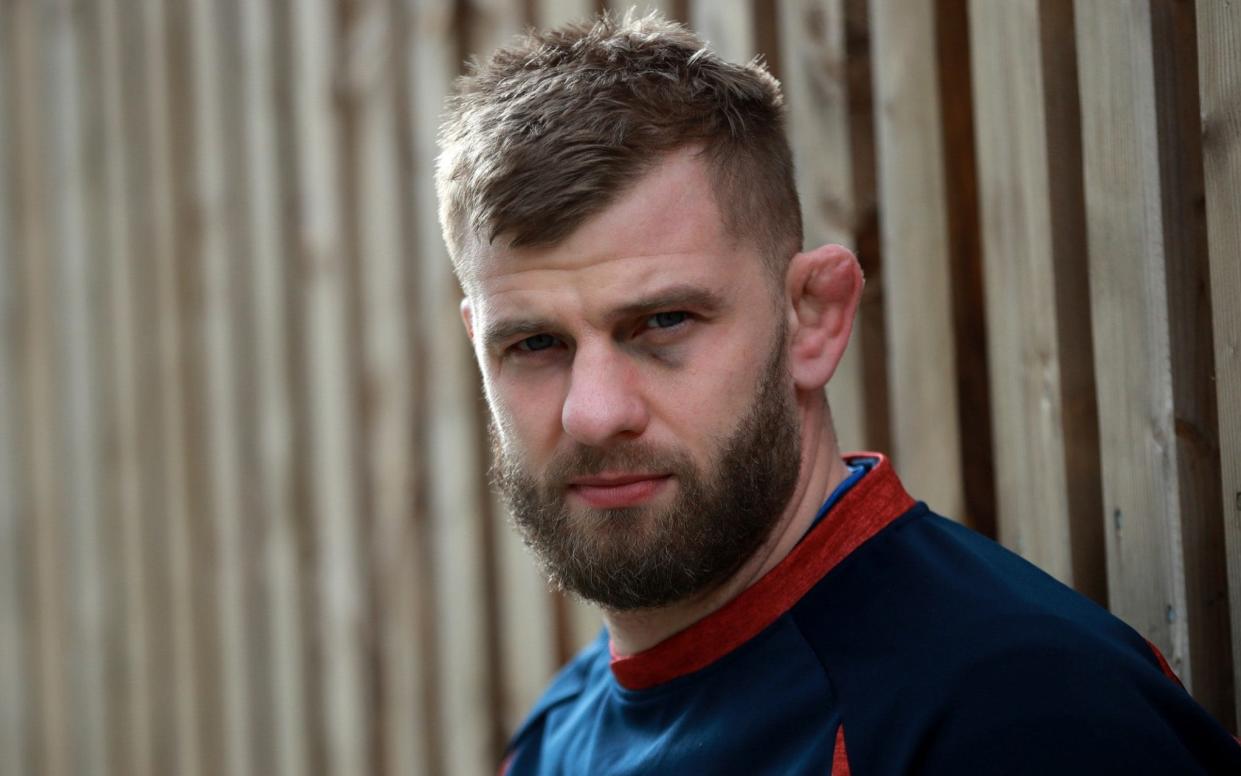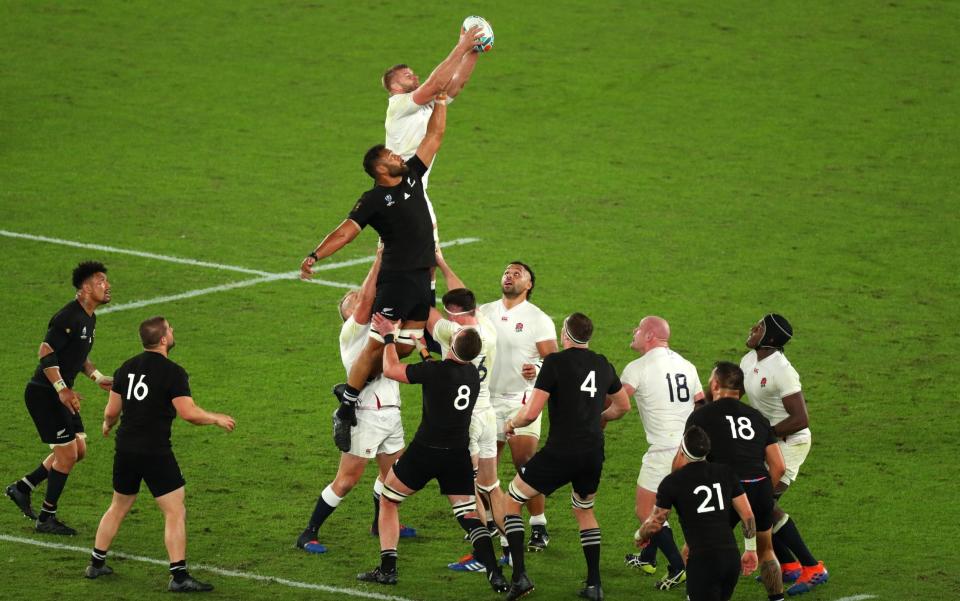George Kruis: 'Moving to Japan is definitely not an England retirement'

George Kruis has insisted that his departure from Saracens is “definitely not an England retirement” as the lock confirmed he will join Japanese club Panasonic Wild Knights in November.
Kruis has signed a “one plus one” contract – one year with the option to extend for another – and Telegraph Sport understands he will earn in the region of £450,000 per season before tax.
Based in Ōta, around 75km outside Tokyo, and coached by former Australia boss Robbie Deans, Panasonic Wild Knights have boasted international stars such as ex-Wallabies back-rower David Pocock, New Zealand lock Sam Whitelock and prolific Japan wing Kenki Fukuoka.
Wales centre Hadleigh Parkes is also due to arrive at the same time as Kruis, who will end a 12-year association with Saracens after five Premiership titles and three European Cups triumphs.
He did not rule out farewell appearances for Mark McCall’s side between July and October, perhaps in between Japanese lessons in St Albans. Still, his move clearly throws his immediate international future into doubt given the Rugby Football Union’s policy of confining selection to Premiership players.
Even so, having started England’s last three Tests in the 2020 Six Nations, underlining the value of his lineout nous and contributions around the field, Kruis still hopes to add to his 45 caps.
“It is not a rash decision,” he said. “It is something I have been thinking about doing for a number of years now.
“I know I am only 30 so I would like to think there is plenty left in the legs and this is definitely not an England retirement.
“I have the opportunity to do a one plus one so that leaves things nice and open. I am massively still interested in international honours and Lions honours, whatever I am invited to play in.
“For me, it is definitely not an international retirement. It is a chance for me to properly explore something that has been itching me for a very long time.
“No-one really knows what is going on at the moment with internationals, whether there are opportunities before or after [November]. It is up to the coach.
“From my side, it is not retirement from international rugby, it is just an opportunity to better myself for a season.”
The deal was finalised after Kruis “fell in love with Japan” during England’s Rugby World Cup 2019 campaign. Since then, he has been in touch with Deans, Whitelock and Parkes.

There have also been discussions with Eddie Jones and with British and Irish Lions head coach Warren Gatland with an eye on next summer’s tour of South Africa to complement Kruis’ trip to New Zealand in 2017.
“I have been speaking to [Jones] for a number of years about this,” Kruis said. “And also to coaches at Saracens and Nigel [Wray]. They have known my plans.
“Over two years ago I sat down with them individually. This is something massively intriguing for me and I like to keep people in the loop along the way. Our conversations have gone well. Eddie is a brilliant coach and he is nice and understanding.”
“I have spoken with [Gatland] and let him know that I would love to be involved [on the 2021 tour],” Kruis added. “But, like anything, it depends on selection.
“I want him to know I would love to go and by going to Japan I don’t see that as counting myself out. I thoroughly enjoyed it last time and it is something I would love to be a part of but only time will tell.”

James Haskell represented Ricoh Black Rams between 2011 and 2012. Geoff Parling played for Sanix Blues. More recently, Ben Te’o has spent the current Super Rugby campaign at the Sunwolves franchise – with Jones facilitating Te’o’s move from Worcester Warriors.
Kruis will add to a growing number of Englishmen heading to the Far East. Bath fly-half Freddie Burns is poised to link up with Shokki Shuttles and Kruis’ Saracens teammate, Alex Goode, will take up a season-long loan with NEC Green Rockets.

The difference, symbolic of a changing player market, is that Kruis is an incumbent international. Jones may prioritise younger locks in the build-up to 2023, yet it feels significant.
Since Rugby World Cup 2011, the RFU have only relaxed their home-based selection policy – for Haskell in 2012, Te’o in 2016 and Brad Shields in 2018 – over individuals that are about to embark on Premiership contracts.
Both chief executive Bill Sweeney and Jones have been rather ambiguous about whether Saracens players could play Tests after moving to foreign clubs, but the RFU stressed yesterday that “current rules still stand, so players must be playing club rugby in England”.
Describing Kruis’ move as one that “offers the opportunity for a different rugby experience”, Jones gave his blessing to a “tough and well-respected member of our team”.
With pay-cuts across the Premiership, the financial benefits of a job in Japan, where clubs are part of major corporations and have a limited number of fully-professional players, seem especially attractive amid a climate of uncertainty.
Historically, players from the southern hemisphere have been more frequent visitors because of geography, timing of the Japanese season and – in the cases of Whitelock and Brodie Retallick of Kobelco Steelers – New Zealand Rugby’s sabbatical scheme.
The 2021 Top League season is set to run from next January until May and Kruis hopes that a shorter, sharper schedule in an improving competition may extend his career into his 30s.
“That will be part of my thinking,” said Kruis. “But I'm not expecting it to be easy. You see how they play and they train hard. It ticks a lot of boxes.”
Saracens’ relegation to the Championship after the salary-cap scandal, as Kruis acknowledges, suits the timing of his exit, even if his mind was already made up.
He would not be the first to enjoy an international renaissance after Japan – Jerome Kaino returned to the All Blacks fold and lifted Rugby World Cup 2015 – and a second spell at Saracens would be Kruis’ “ideal”.
“I have an unbelievable love for the club,” he said. “I would never play for another Premiership club. This is about doing something on the other side of the world.”

